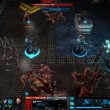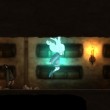The Wolf Among Us: Episode 3 – A Crooked Mile Review
The more you know, the less that's clear. In A Crooked Mile, the third episode in the ongoing Wolf Among Us saga, details start coming into focus, but the role each character plays in this noir mystery is still hidden behind a thick veil. There are puppets and there are puppetmasters, kings, and pawns, and the big bad wolf can't win this murderous game using his wits alone. It's time for the claws to come out.
Sheriff Bigby does not roar his way through the episode, however, with his animal instincts barely under control. In fact, the Bigby I've come to know has learned how to better navigate the politics and personal relationships that heat up the series' plot advancements. In this episode, I could have disrupted a funeral and devastated those in mourning, but Bigby understands love and grief better than his fellow fables give him credit for. It's hard to forget the sheriff's violent choices--not when facing a former victim of his wrath, and certainly not when staring at the empty space where that victim's right arm used to be. But for Bigby, respecting someone's grief is more vital than revisiting a grudge.
I love that The Wolf Among Us allows me to claim authorship in this manner. I know that I am constrained by the choices developer Telltale Games allows in this story-driven adventure series, yet somehow I'm always presented with options that make sense for the Bigby I have helped craft. My Bigby cares, but he has no patience for nonsense. He is fearless when peering down the barrel of a firearm, but is scared stiff by the prospect of interrogating a sweet-voiced child. In one excellent scene after another, I could express these traits, and in the process, learn about the fables that surrounded me. In one of the episode's most poignant scenes, an investigation of a medicated crime victim turns into a touching exploration of familial devotion. In the midst of tragedy comes an oasis, and while I might have disturbed the reverie, I chose to share in the comfort. Given the episode's unrelenting tension, I needed it. Bigby needed it. We needed to know if seeking answers was worth being feared and distrusted.

The episode builds this dramatic tension with great care. Where episode two simmered, episode three boils, and then erupts in volcanic fashion, with the most strenuous narrative events smartly enhanced by equally tense quick-time events. Near the story's end comes a moment of extreme desperation--desperation that is mirrored in the key presses that accompany it. It's a fantastic scenario, made more effective by the episode's gradual crescendo. The narrative arc reaches an eye-popping climax, but there's no catharsis. Bigby huffs and puffs, but the murderer's walls have yet to come tumbling down.
I wish I could say more, but I fear that divulging the details would risk spoiling events best discovered on your own. I can tell you that one of Bigby's associates demonstrates unexpected resolve, and in doing so complements Bigby's increasingly empathetic tendencies, but the who and the why of it I shall keep secret. You learn how easy it is to interpret emotional weakness as calculated evil, but I'm not prepared to offer anything more on that subject. What I can say is that playing A Crooked Mile was exhausting. Each line of dialogue pulsed with meaning, and at every turn, I feared that Bigby and I might tumble over the edge we kept peering over. Episode two made me wonder; episode three made me ache.

The Wolf Among Us' triumphs are even more impressive when you consider how rarely it stumbles. In A Crooked Mile, I carefully avoided disclosing to an inebriated Grendel the purpose of my visit to the Trip Trap bar, making his sudden acknowledgment of that purpose seem incongruous, as if the game were forcing every conversational avenue to reach the same junction. The fact that such moments are rare is no small feat, and the episode's overall consistency and expert pacing ensured my uninterrupted attention. I am wholly invested in this world of contorted fairy-tale fantasies, and I long to iron away its crooked customs, though I suspect that I, as Bigby, can only treat the symptoms but never cure the disease.









